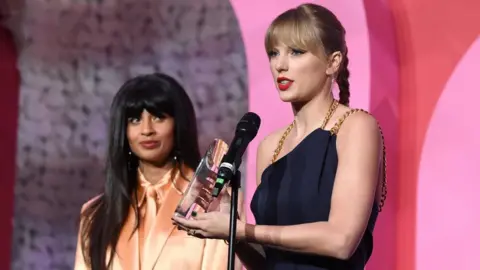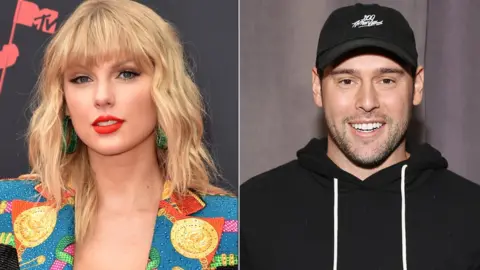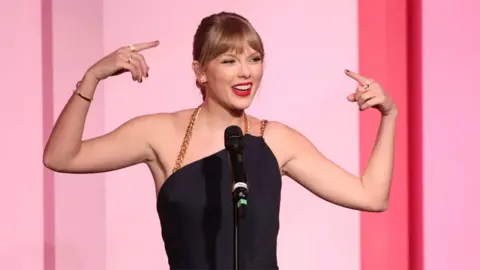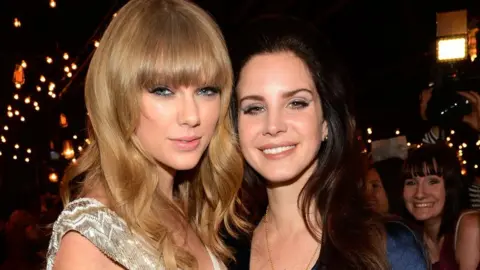Taylor Swift blasts 'toxic male privilege' during Woman Of The Decade speech
 Getty Images
Getty ImagesTaylor Swift was named Billboard's woman of the decade on Thursday night - but her speech contained none of the usual award show platitudes.
Instead, the star criticised "toxic male privilege" in the music industry, championed fellow female artists and escalated her feud with Scooter Braun.
"Women in music are not allowed to coast," she observed. "We are held at a higher, sometimes impossible-feeling, standard."
"I've seen a lot," she added.
Allow Google YouTube content?
Swift, who turned 30 on Friday, opened her 15-minute speech by reflecting on the last decade of her career, and the struggles she had faced.
She said that in her early days, critics had speculated that "a male producer or co-writer" was the real reason for her success; or that a "savvy record label" was responsible for making her a star.
"It wasn't," she said pointedly. "People want to explain away a woman's success in this industry".
"In the last 10 years, I have watched as women in this industry are criticised and measured up to each other and picked at for their bodies, their romantic lives, their fashion," she continued.
"Have you ever heard someone say about a male artist, 'I really like his songs, but I don't know what it is - there's just something about him I don't like?'
"No - that criticism is reserved for us."
But Swift noted that female artists were thriving anyway, listing contemporaries like Lana Del Rey, Billie Eilish and Lizzo as examples of women who "have taken this challenge, and they have accepted it".
"It seems like the pressure that could've crushed us made us into diamonds instead."
 Getty Images
Getty ImagesSwift also continued her war of words with music mogul Scooter Braun, who snapped up the rights to her first six albums in June, through a private equity deal.
The star said Braun's defenders, many of whom were in the room, were guilty of propping up "toxic male privilege" in the music industry as she vowed to fight for control of her music, saying: "I'm obviously not going willingly".
Here are the highlights of her speech.

On Scooter Braun and losing the rights to her music
"Lately, there's been a new shift that has affected me personally, and that I feel is a potentially harmful force in our industry. And as your resident loud person, I feel the need to bring it up: And that is the unregulated world of private equity coming in, and buying up our music, as if it is real estate, as if it's an app, or a shoe line.
"This just happened to me without my approval, consultation, or consent. After I was denied the chance to purchase my music outright, my entire catalogue was sold to Scooter Braun's Ithaca Holdings in a deal that I'm told was funded by the Soros family, 23 Capital and the Carlyle Group.
"Yet, to this day, none of these investors have ever bothered to contact me or my team directly, to perform their due diligence on their investment, on their investment in me, to ask how I might feel about the new owner of my art - the music I wrote, the videos I created, photos of me, my handwriting, my album designs. And of course Scooter never contacted me or my team to discuss it prior to the sale, or even when it was announced.
"I'm fairly certain he knew how I would feel about it, though, and let me just say that the definition of the toxic male privilege in our industry is people saying, 'But he's always been nice to me!' when I'm raising valid concerns about artists and their right to own their music.
"Of course he's nice to you. If you're in this room, you have something he needs.
"The fact is that private equity is what enabled this man to think, according to his own social media post, that he could 'buy me,' but I'm obviously not going willingly."

Being caught up in the 'Swift backlash'
 Getty Images
Getty Images"When Fearless [won] album of the year at the Grammys... with that win, came criticism and backlash in 2010 that I'd never experienced before as a young, new artist.
"All of a sudden, people had doubts about my singing voice. Was it strong enough? Was I a little bit pitchy? All of a sudden, they weren't sure if I was the one writing the songs because sometimes in the past I had had co-writers in the room.
"At that time, I couldn't understand why this wave of harsh criticism had hit me so hard. I believe a popular headline back then was 'A Swift Backlash,' which is clever - you gotta give it to them.
"And now I realise that this is just what happens to a woman in music if she achieves success or power beyond people's comfort level. I now have come to expect that with good news comes some sort of pushback, but I didn't know that then."

On appeasing her critics
"[After the backlash] I decided that I would be the only songwriter on my third album, Speak Now, and that I would tour constantly, work on my vocals every day, and perfect my stamina in a live show.
"I decided I would be what they said I couldn't be.
"I didn't know then that, soon enough, people would decide on something else I wasn't quite doing right, and then the circle would keep going on and on, and rolling along, and I would keep accommodating, over-correcting, in an effort to appease my critics.
"They're saying I'm dating too much in my 20s? OK, I'll stop. I'll just be single... for years.
"Now they're saying my album Red is filled with too many break-up songs? OK, I'll make one about moving to New York, and deciding that really my life is more fun with just my friends.
"Oh, they're saying my music is changing too much for me to stay in country music? Alright, OK, here's an entire genre shift, and a entire pop album called 1989. Oh, you heard it? Sick!"

How Lana Del Rey is 'the most influential artist in pop'
 Getty Images
Getty Images"I've learned that the difference between those who can continue to create in that climate usually comes down to this: Who lets that scrutiny break them, and who just keeps making art.
"I've watched as one of my favourite artists of this decade, Lana Del Rey, was ruthlessly criticised in her early career, and then slowly but surely, she turned into, in my opinion, the most influential artist in pop. Her vocal stylings, her lyrics, her aesthetics. They've been echoed and repurposed in every corner of music, and this year, her incredible album is nominated for Album of the Year at the Grammys because she just kept making art.
"And that example should inspire all of us, that the only way forward is forward motion. That we shouldn't let obstacles like criticism slow down the creative forces that drive us."

Why female artists are thriving
"I see [a] fire in the newer faces in our music industry, whose work I absolutely love. I see it in Lizzo, Rosalía, Tayla Parx, Hayley Kiyoko, King Princess, Camila Cabello, Halsey, Megan Thee Stallion, Princess Nokia, Nina Nesbitt, Sigrid, Normani, H.E.R., Maggie Rogers, Becky G, Dua Lipa, Ella Mai, Billie Eilish, and so many other amazing women who are making music right now.
"Female artists in music have dominated this decade in growth, streaming, record and ticket sales, and critical acclaim. So why are we doing so well? Because we have to grow fast, we have to work this hard, we have to prove that we deserve this, and we have to top our last achievements.
"Women in music, onstage, or behind the scenes, are not allowed to coast. We are held at a higher, sometimes impossible-feeling standard. And it seems that my fellow female artists have taken this challenge, and they have accepted it. It seems like the pressure that could've crushed us made us into diamonds instead."

On the future
"Lately I've been focusing less on doing what they say I can't do and more on doing whatever the hell I want. Thank you for a magnificent, happy, free, confused, sometimes lonely, but mostly golden decade. I'm honoured to be here tonight, I feel very lucky to be with you, thank you so much."

Follow us on Facebook, or on Twitter @BBCNewsEnts. If you have a story suggestion email [email protected].
